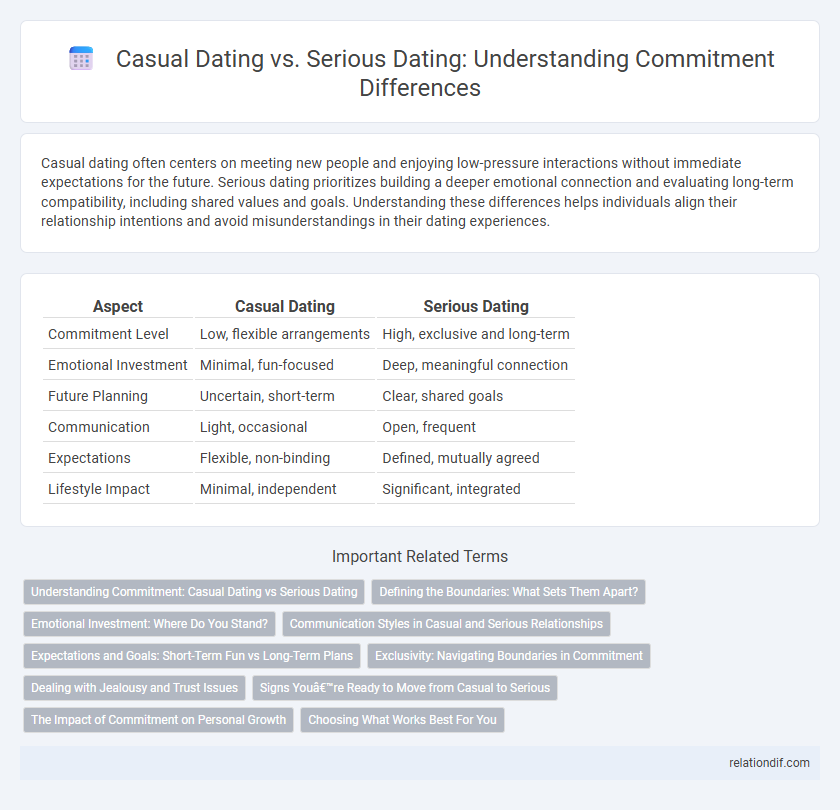Casual dating often centers on meeting new people and enjoying low-pressure interactions without immediate expectations for the future. Serious dating prioritizes building a deeper emotional connection and evaluating long-term compatibility, including shared values and goals. Understanding these differences helps individuals align their relationship intentions and avoid misunderstandings in their dating experiences.
Table of Comparison
| Aspect | Casual Dating | Serious Dating |
|---|---|---|
| Commitment Level | Low, flexible arrangements | High, exclusive and long-term |
| Emotional Investment | Minimal, fun-focused | Deep, meaningful connection |
| Future Planning | Uncertain, short-term | Clear, shared goals |
| Communication | Light, occasional | Open, frequent |
| Expectations | Flexible, non-binding | Defined, mutually agreed |
| Lifestyle Impact | Minimal, independent | Significant, integrated |
Understanding Commitment: Casual Dating vs Serious Dating
Understanding commitment involves recognizing that casual dating emphasizes flexibility and minimal emotional attachment, allowing individuals to explore connections without long-term expectations. Serious dating requires a deeper level of dedication, prioritizing emotional intimacy, trust-building, and shared future goals. Commitment in serious relationships often includes exclusivity and active communication to maintain a strong, lasting bond.
Defining the Boundaries: What Sets Them Apart?
Casual dating involves minimal emotional investment and flexible boundaries, prioritizing fun and social connection without expectations of exclusivity or long-term commitment. Serious dating requires clear communication of intentions, mutual agreement on exclusivity, and a focus on building trust and future planning. Defining these boundaries helps individuals align their expectations, prevent misunderstandings, and foster relationships that meet their emotional needs.
Emotional Investment: Where Do You Stand?
Emotional investment in casual dating tends to be low, with individuals prioritizing fun and connection without long-term expectations, whereas serious dating demands deeper trust, vulnerability, and consistent emotional availability. Understanding where you stand emotionally helps clarify your intentions and prevents misunderstandings, fostering healthier relationships. Assessing your readiness for commitment ensures alignment with your partner's expectations and promotes emotional well-being.
Communication Styles in Casual and Serious Relationships
Casual dating often involves light, open communication focused on present enjoyment and boundaries without expectations for future planning. Serious relationships require deeper, consistent communication that fosters trust, emotional intimacy, and shared goals over time. Effective communication styles differ significantly, with serious dating emphasizing clarity, vulnerability, and conflict resolution to support long-term commitment.
Expectations and Goals: Short-Term Fun vs Long-Term Plans
Casual dating emphasizes short-term fun with flexible expectations and minimal commitment, often focusing on enjoyment and social interaction without long-term plans. Serious dating prioritizes long-term goals such as relationship growth, emotional connection, and future planning including cohabitation or marriage. Clear communication of expectations is crucial to ensure alignment between partners and avoid misunderstandings.
Exclusivity: Navigating Boundaries in Commitment
Exclusivity is a key factor distinguishing casual dating from serious dating, as serious relationships prioritize clear boundaries and mutual commitment to one partner. Navigating these boundaries involves open communication about expectations, ensuring both individuals agree on monogamy and emotional investment. Establishing exclusivity fosters trust and sets the foundation for deeper emotional connection and long-term commitment.
Dealing with Jealousy and Trust Issues
Casual dating often involves navigating jealousy and trust issues with less intensity, as emotional investment is typically lower compared to serious dating. In serious relationships, commitment heightens vulnerability, making honest communication and establishing clear boundaries essential to manage jealousy effectively. Building trust through consistent behavior and emotional transparency forms the foundation for overcoming insecurities in committed partnerships.
Signs You’re Ready to Move from Casual to Serious
Recognizing genuine emotional connection and consistent communication are key signs you're ready to move from casual to serious dating. Prioritizing long-term compatibility over fleeting excitement indicates a readiness for commitment and deeper intimacy. When shared goals and mutual respect become central, transitioning to a serious relationship becomes a natural progression.
The Impact of Commitment on Personal Growth
Commitment in serious dating fosters deeper emotional development and self-awareness compared to casual dating, which often prioritizes immediate gratification over long-term connection. The stability of committed relationships encourages individuals to confront personal challenges and cultivate patience, empathy, and communication skills. In contrast, casual dating may limit opportunities for meaningful personal growth by emphasizing short-term interactions rather than sustained emotional investment.
Choosing What Works Best For You
Casual dating offers flexibility and low pressure, allowing individuals to explore connections without long-term obligations, while serious dating involves deeper emotional investment and commitment, often leading to exclusive partnerships. Choosing what works best hinges on personal goals, emotional readiness, and lifestyle preferences, ensuring alignment with individual values and relationship expectations. Prioritizing open communication and self-awareness helps identify which dating approach fosters fulfillment and authenticity in connections.
casual dating vs serious dating Infographic

 relationdif.com
relationdif.com